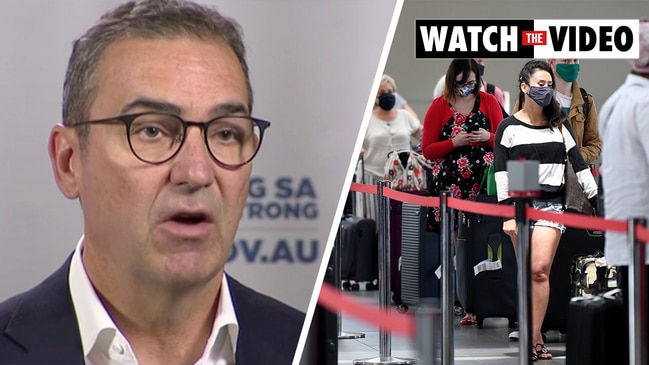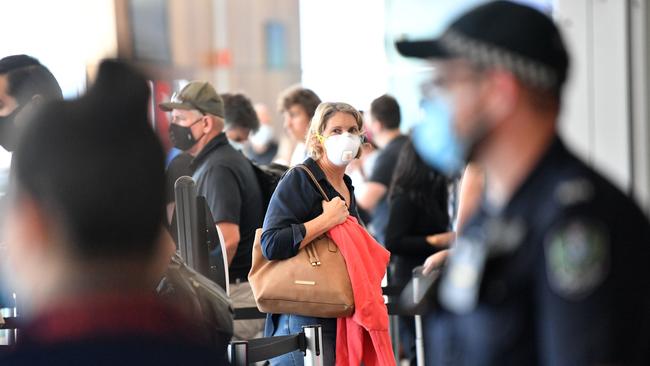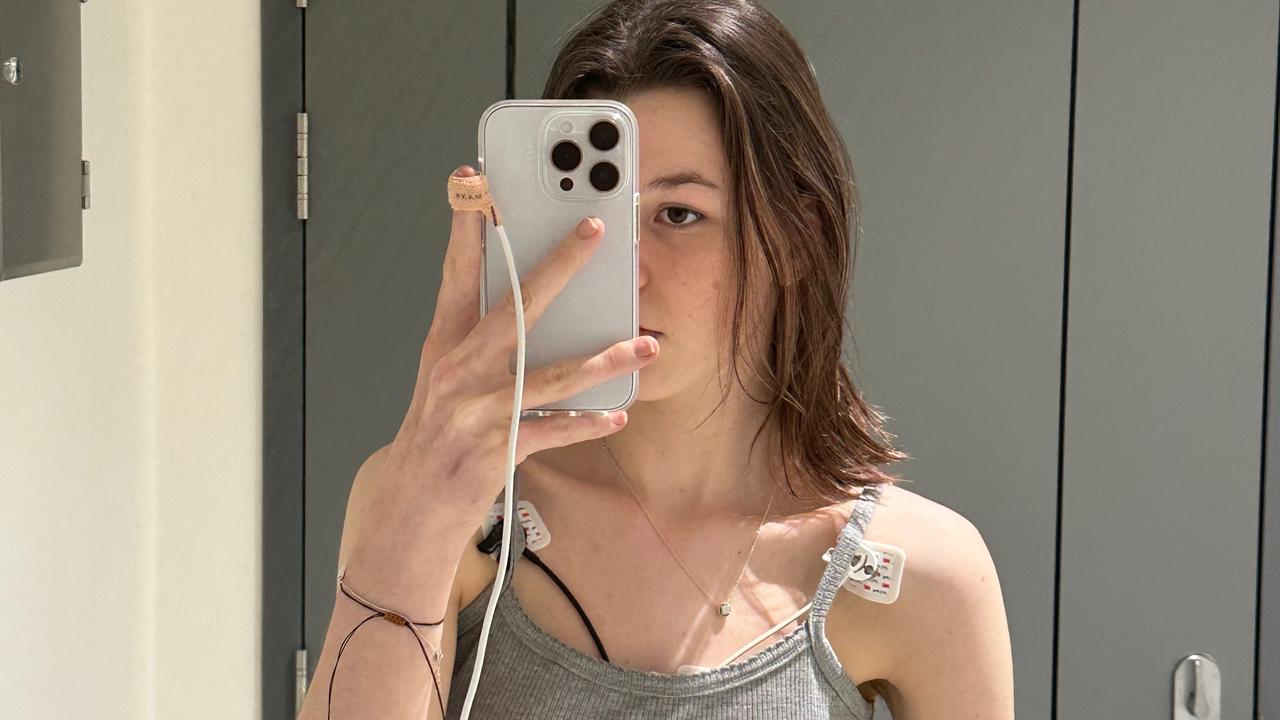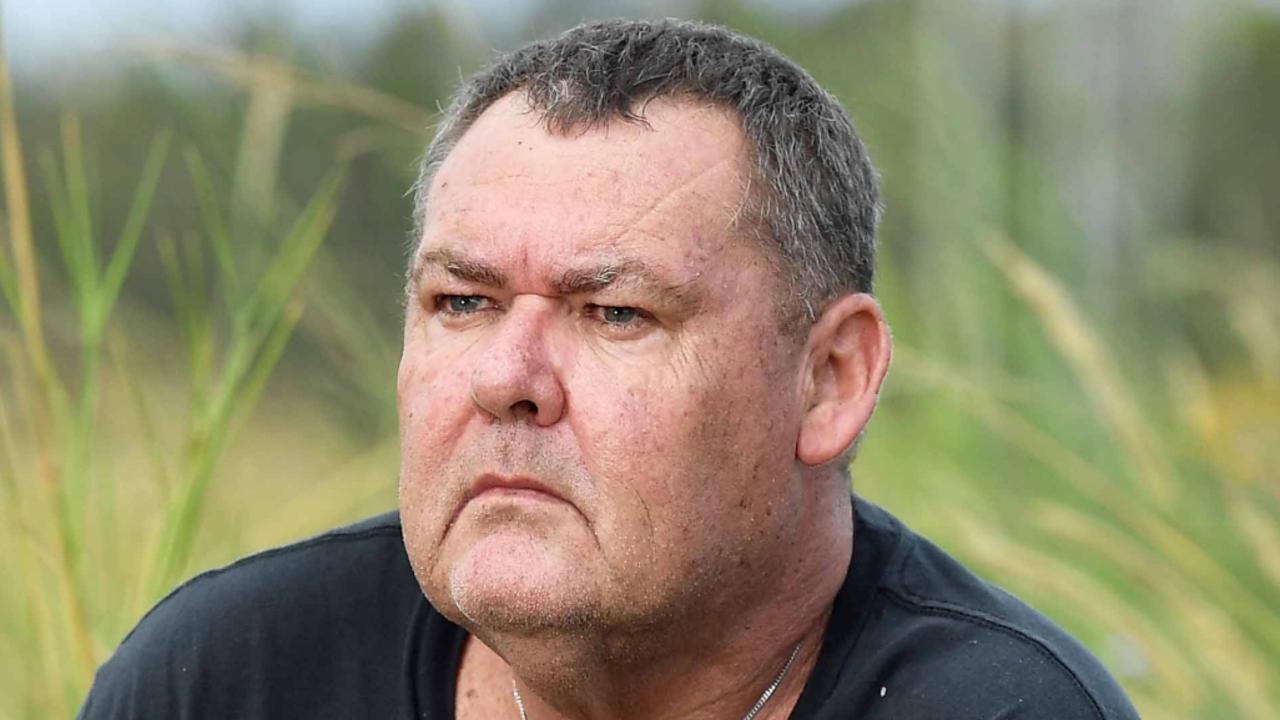Police Commissioner Grant Stevens explains what led to border restrictions muddle as more travellers released from quarantine
More than half of the travellers who were wrongly told to quarantine after Sunday’s border bungle have now been released.

Coronavirus
Don't miss out on the headlines from Coronavirus. Followed categories will be added to My News.
SA Police have been contacting hundreds of people who travelled from NSW to SA and were wrongly told to quarantine before the new restrictions came into effect.
The state’s top cop on Monday apologised for a series of blunders that tarnished Christmas for 550 NSW arrivals at Adelaide Airport wrongly told to isolate.
In a day of confusion, 160 people were released from quarantine because they had in fact arrived before new coronavirus border bans were enforced at 12.01am Monday.
By Tuesday morning, SA Police said a total of 375 people had been contacted – 350 have now been released while 25 remain in quarantine. Police plan to speak to a further 175 travellers later today.
A communications breakdown by authorities forced another 100 travellers to turn back after patrols at four road checkpoints wrongly stated anyone from greater Sydney must immediately quarantine.
Those who returned to Sydney must now apply for a special SA Health exemption if they wish to enter the state.
After a fierce public backlash, Police Commissioner Grant Stevens on Monday apologised for the fiasco, with the State Government now considering compensating affected travellers.
Mr Stevens, who authorised the hotspot changes as state COVID co-ordinator, defended his “A-game” team.
“This is a very unfortunate set of circumstances, at a very unfortunate time of the year, when people are travelling to spend Christmas with their families,” said Mr Stevens, who was first told of problems at 9.30pm on Sunday by friends.
“We do apologise to those people who are affected by this particular oversight. We understand the impact it has on families. We know … there are people out there who are probably going to have a different Christmas to what they had anticipated.
“But all of these decisions are made in the best interests of the … community and trying to prevent COVID-19 from coming through the borders.”
In hopeful signs the Sydney outbreak has been controlled, NSW Health on Tuesday recorded eight new cases of locally transmitted coronavirus – marking a further drop in daily cases since the coronavirus cluster in Sydney’s northern beaches area broke out last week. The new figures come as Victoria confirmed an infected person who had been in Sydney was picked up by authorities as an “interstate case”. SA again recorded no new cases.

SA authorities say current border restrictions are adequate, but Queensland and Victoria on Monday introduced hard closures to NSW.
Mr Stevens and chief public health officer Nicola Spurrier said Christmas Day rules would not change at this stage.
SA Police directions – formally approved at 11.49pm on Sunday – ordered travellers from Greater Sydney, the Central Coast and Wollongong local government areas into quarantine for 14 days if they arrived after midnight. They must also take COVID-19 tests on the first, fifth and 12th day of quarantine.
Anybody from Sydney’s northern beaches – deemed a high-risk hotspot – will be refused entry into SA.
SA Health said anyone who arrived before 12.01am Monday and had visited the Northern Beaches Council area since December 11 also must quarantine for 14 days and be tested on days one, five and 12. This also applies to visitors from suburbs of Cronulla, Lane Cove, Turramurra, Woolloomooloo, Lavender Bay and Penrith. There are 70 people in quarantine who arrived from the hotspots before Monday down from 180 on Saturday.
NSW regional travellers must have a COVID-19 test but do not have to isolate while awaiting results. If they arrived after last Thursday, they must get tested on days 1, 5 and 12.
Also apologising for the blunders, Professor Spurrier said testing facilities would be available at Christmas.
“Please remember, though, if you wake up sick that morning, do not go to your family Christmas party,” she said.
“The last thing they want as a present is to get sick with COVID.”


